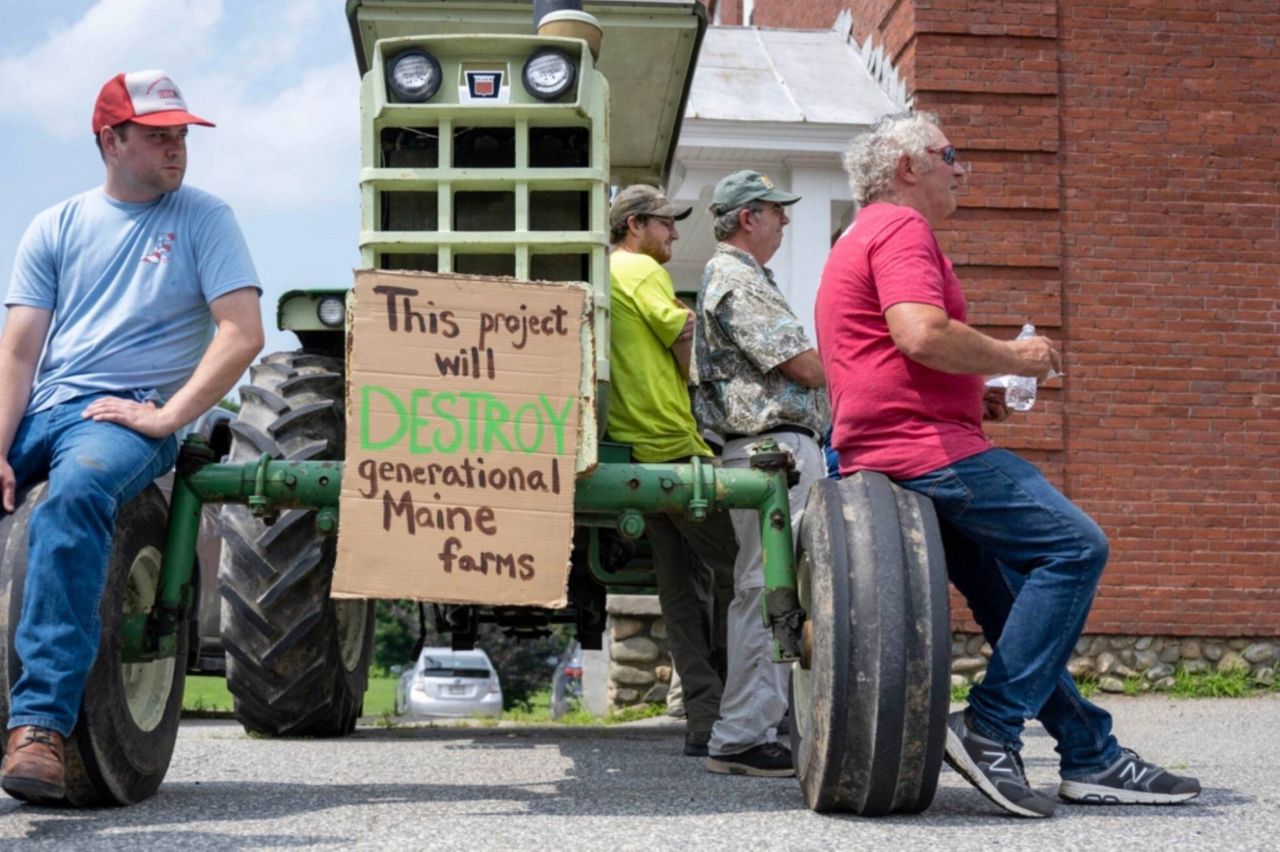About 30 farmers from Albion, China and Palermo drove their tractors or trucks Wednesday to the Albion Town Office to protest a proposed transmission corridor that they say could decimate their livelihoods.
The Aroostook Renewable Gateway Project, proposed by LS Power Grid Maine, a subsidiary of Missouri-based LS Power, would extend transmission lines across some 150 miles to tap into northern Maine’s robust wind power resources. Aroostook County lacks a connection to New England’s electric grid, but the project would change that.
Lawmakers and Gov. Janet Mills gave the project momentum in June when they signed off on a bill for construction of the high-voltage line. Supporters tout, among other things, the jobs the project would generate in northern Maine, but central Maine farmers say its construction could destroy farms that families have operated for generations by clearing productive agricultural land and driving down property values.
“Placing this transmission line corridor on our farmland will destroy our ability to keep farming in the future and add to the current hardship that farmers are already facing,” Chuck Noyes, owner of Noyes Family Farm in Albion, said in a statement prior to the protest. “We’ve seen a lot of hurdles over the years in operating our longstanding dairy farm business, but this one would do us all in. Once the farmland is gone, it won’t be back.”
The Noyes Family Farm has 100 cows as part of its dairy operations, and also grows hay and corn on 370 acres. The business is now in its eighth generation of the family, Holly Noyes, the daughter of Chuck Noyes, said Wednesday. The family helped organize the protest.
Landowners who could be affected by the corridor received notice of the project through letters mailed to them about two weeks ago. Soon afterward, Holly Noyes said, farmers set about rallying community support against the proposal.
“We’ve had to come together for a fast response and organize,” Holly Noyes said Wednesday. “We don’t have the resources for a lawyer and lobbyists.”
Protestors gathered a couple of hours before a public meeting LS Power had organized in Albion to answer questions from residents. The company has held several meetings in other communities over the past week, and another is planned for Thursday at the fairgrounds in Windsor at 82 Ridge Road.
Some farmers said they were attending the Albion public meeting to ask questions of LS Power. Matt Dow, a dairy farmer who has operated SweetLand Farm in Albion for six years, said he wanted clarification about whether the transmission corridor, which he said could potentially split his 102-acre parcel of land in half, could affect his organic certification. Dow ships his produce to Organic Valley, an organic food brand, and fears for the future of his business if the corridor were built.
The line would connect two new substations, one near Glenwood Plantation in Aroostook County and another near either Dixmont or Detroit, LS Power says. An additional station would be built near an existing Coopers Mills substation. The line is designed to carry up to 1,200 megawatts.
LS Power says the project would “create hundreds of construction jobs, provide tens of millions of dollars in new tax base to host communities, deliver fixed price renewable energy from Aroostook County to provide power to Maine homes and businesses and enhance transmission grid reliability.”
State approval of the project is just an initial step in what is expected to be a yearslong process to secure permits from several regulatory agencies. Should all those approvals be granted, LS Power’s own timeline does not have the clearing of land beginning until 2026 and the transmission of power along the corridor until 2028.
Maine utilities would buy 60% of the output from the wind farm, while Massachusetts would pay 40% of the project costs. Maine’s share of the power would be purchased by either Central Maine Power Co. or Versant Power, or both. By law, neither company supplies or generates electricity.
Organizers of the protest said Albion, China and Palermo have some of the best land in the state for agricultural production. Holly Noyes said farming is the backbone of Albion’s economy and every field in the area is being used for agricultural production. The town is home to 10 dairy farms, she said, and the transmission corridor would eat into land that has been providing hay since the 1800s, when the hay was taken to Belfast and shipped to England.
“It’s gonna take acres out of production,” said Jesse Haskell of Haskell Farm in Palermo, which produces milk, other dairy products and hay. Haskell, a fourth-generation farmer, said his 350 acres of farmland will plummet in value if power lines split the land.
“My family has worked this hard for this long, and it’s all ruined,” he said Wednesday. “I want people to really think about how the state government’s decision affects the communities they’re blazing trails through.”
Noyes said many farmers feel powerless to stop the project in the face of corporate lobbyists.
“It’s horrifying. People aren’t sleeping,” she said. “(They’re) crying, feeling hopeless. For some people, this is all they have.”
Her father noted that news of the corridor comes on top of a dreadful farming season due to weeks of rain.
“This year has been one of the worst years on record for farming, with over 12 inches of rain in eight weeks, and now we must deal with this threat to our farmland and businesses on top of it,” Chuck Noyes said. “We would like to focus on what we know best: Farming and providing food for our communities.”
To get more news and information from this partner, subscribe here.




